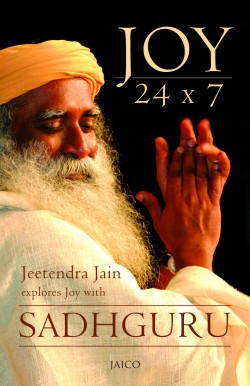
During the COVID-19 pandemic, many people are glued to their media screens. They spend a good part of the day scrolling through what seem like endless newsfeeds from around the world. There are stories of kindness, but there are also a plethora of traumatic stories and images.
When people are exposed to upsetting information on a constant basis, they often experience feelings of distress. A person’s mood and behavior can shift throughout the day because of this overload of disturbing and upsetting content. How can we help avoid this within ourselves and others?
Hello! Magazine’s May 2020 issue features Sadhguru on the cover. The interview gives us a mystic’s perspective on the current pandemic and, in the face of emerging challenges, implores us to rethink how we have structured our lives and societies.
- From a spiritual perspective Guruji, how do you feel the pandemic has asked human beings and human ecosystems to ‘reinvent’ the way they exist and co-exist?
Sadhguru: Now animals are saying, “Let’s make the planet great again!” Peacocks are dancing on a Mumbai street. From Punjab, Himalayan peaks can be seen for the first time in twenty years, as the smog has cleared. For a long time, we have infested this planet, slowly taking the life out of it. Every other creature on the planet is terrified of the human virus.
Humanity should take a 3-week break every year from polluting technologies – all machines off. This break can be made use of to turn inward. If everyone uses this time to upgrade themselves physically, mentally, emotionally, and in terms of their competence, we would be living in a fantastic world.
The virus is slowly bringing mortality home, into everyone’s minds and hearts. Once you see that you are mortal, you will naturally put your life in order. I don’t want to make comments on people’s lifestyles, but many times it amazes me. Once I was in a mall in the United States and there were twenty kinds of instruments just to trim your nose hair! So this is the time to rejig our life and see: can we live with a little less? If you make it a law, it becomes ugly, but if it happens consciously, it is wonderful.
- If you had to pen a few lines where this virus ‘speaks’ to us all on ways to reinvent…right from our mindset to recreating our reality, what kind of speech would this virus make?
Sadhguru: Actually, the virus would like to see that you don’t learn anything new! It does not want you to produce some antibodies against it. See, maybe the virus was living in some other creatures in the animal kingdom, but its habitat shrunk. So it decided to come to us as there are so many of us. Its intent is not to kill you but to find a new habitat to live. It is just that it lives so virulently that we cannot withstand it and collapse. But scientists are estimating in a few months’ time, the virus will mutate itself into a milder version, so that it can easily live in our bodies.
So the virus is not interested in teaching you anything. But this situation is making people conscious that they are here for a brief amount of time. The very soil you walk upon is also the body that is so valuable to you. If we realize this every moment of our life, we would definitely tread much more gently upon this planet.
- In many societies, people rally together during crisis time – a younger generation will go out and wait in grocery lines to bring groceries home for the extended family. In the West, where individualism is rife, it has been observed that older people have little care infrastructure. A diplomat friend says the elderly who live alone have been ill prepared for such a pandemic. Do you feel the West will realize that individualism has limited appeal at some stage and in some circumstances?
Sadhguru: Don’t imagine that every young Indian boy or girl is ready to pick up groceries for you. They are doing it because the economy compels it. Two or three generations ago, a family meant you, your spouse, children, parents, uncles, aunts, grandparents – a single family may have had 300-400 people. One important aspect to this was the economic binding in a family; one head of the family controlled all the economic power, so everyone stayed together because otherwise they would be destitute.
Today everyone can go out, or even work from home, and earn money. There is no economic binding anymore. It is not just about the West. In India also, as more economic wellbeing comes, people will opt to live alone more, because they cannot stand anyone. Today, family means husband, wife, and children. If parents are very sick, sometimes they can visit you. Maybe in the West it has gone further; now a family is just one person – either a man or a woman – with a child. And people beyond a certain age are being left to fend for themselves; even those in community homes may get medical care but not necessarily an atmosphere of inclusion.
We must be sincere enough to admit that human families and societies are still need driven. If there are no needs it will fall apart. This is why it is very important to form a conscious society, where everyone is there by choice and a deep sense of inclusiveness. Many families still enjoy this but many are losing it, unfortunately.






